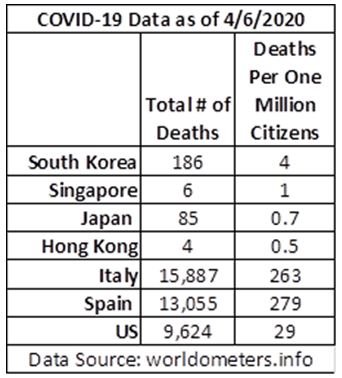Prior to COVID-19, there had been four pandemics over the last century.
| • | The swine flu (2009–2010), which started in Mexico, may have infected as much as 11%–21% of the global population. A study in 2013 estimated that between 123,000 and 203,000 people died. |
| • | The Hong Kong flu (1968–1969) killed an estimated 1 million people worldwide and about 100,000 in the US. |
| • | The Asian flu was first reported in Singapore in 1957. There were approximately 1.1 million deaths around the world and 116,000 in the US. |
| • | The Spanish flu (1918-1919) infected as much as one-third of the global population, killing as many as 50 million people worldwide and 675,000 in the US. |
Asian countries have had a much different experience with infectious disease outbreaks. There are many people alive today in those countries who experienced firsthand the Hong Kong flu and the Asian flu pandemics that each killed more than a million people.
In Western countries, we are prone to doubt, because the fear of deadly outbreaks has always been blown way out of proportion. People in Eastern countries act; the West reacts.
Wearing a mask is not met with stigma in countries that have experienced a recent outbreak, such as SARS in 2003, which killed 8,437 people mostly in China, Hong Kong, and Singapore.
Countries that have slowed the spread of COVID-19 have taken measures beyond shelter in place. Quarantine measures are more strictly enforced, and technology closely tracks people’s every move.
In Singapore, for example, the government is using a cell phone app called TraceTogether to monitor citizens’ every move. Breaking a quarantine can land you a $10,000 fine and/or six months in jail. There was a recent jump in COVID-19 cases in Singapore, but the police state has kept the virus fairly well-contained so far.
South Korea has also had success with using cell phones to trace and contain the outbreak. Its early and fast response to the coronavirus has been so effective that its citizens are not living under lockdown, unlike about a third of the rest of the world.
There are already indications from private companies and the government that technology could be used to help track the US outbreak.
This will certainly spark a new privacy debate
Asian countries that were quick to implement social distancing have managed to slow the spread and save lives.
The same four Asian countries that have flattened the curve have had far fewer total deaths and deaths per capita.

The slightly higher rate of deaths per capita in South Korea (relative to its peers) is most likely due to the fact that more than half of the cases in that country are tied to one church.
Bottom line: Social distancing works. It slows the spread of the disease, which in turn saves lives. We won’t be in lockdown forever, but it should last long enough to ensure that our hospitals have things under control.

